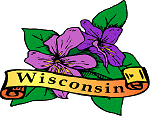

Biographical Sketch of
John C. Truesdell
Transcribed by Char Eckman for the Marquette Co WI Pages
Source: Portrait and Biographical Album of Green Lake, Marquette and Waushara Counties, Wisconsin, published 1890 by Acme Publishing Co., Chicago, Pages 626 - 627 John Calvin Truesdell, an eminent pioneer lawyer of Wisconsin, came into the Territory in 1847, and at the time of his death was the oldest practitioner in the State with the exception of Mr. Finch, of Milwaukee. He was born in the town of Liberty, Susquehanna Co., Pa., on the 11th of January, 1825, and his father was a native of Litchfield County, Conn. Mr. Truesdell, Sr., removed to Susquehanna County, Pa., where his iron will, energy, strict business methods and individuality of character placed him among the prominent men of that portion of the Keystone State. For over a quarter of a century, 'Squire Truesdell was a favorite local magistrate. His wife whose maiden name was Lucy Upson, belonged to one of the oldest Connecticut families. Our subject began preparing himself for the legal profession in the law office of R. B. Little, Esq., of Montrose, one of the best jurists of the State, and at once gave evidence of a great legal mind. He was admitted to the bar by the Supreme Court, in Sunbury, Pa., in 1847, and in the same year, in company with O. B. Tyler, came to Wisconsin and established an office in Oshkosh, whence he removed a year or two later to Fond du Lac, where the firm of Truesdell, Gillett & Tyler was formed, shortly becoming one of the foremost in the State. He also became interested in several business enterprises of considerable note, including the toll bridge across the Fix River, at Oshkosh, the Sheboygan plank road, land entries and village plats, also inland navigation. He owned and ran the steamer "Peytona" on Lake Winnebago between Fond du Lac and Berlin, and transported a large number of immigrants to the so-called Indian lands. Severing all connections with outside speculations, he decided to leave Fond du Lac and in 1857 removed to Berlin, where he remained until the close of the war. The year 1866, he established an office in St. Louis, where he intended to make his future home, but upon the breaking out of the cholera, again came North, where he remained until his death which occurred in Berlin, Dec. 26, 1883. During his later years, he had an office for a time in Princeton and also in Fond du Lac, but closed an eventful career in Berlin. In early life, Mr. Truesdell was a Whig in politics, and was once the candidate of that party for Attorney General for Wisconsin. At the dissolution of the party he became a Democrat and affiliated with that organization until his death. He was nominated by his party for the State Senate and for the Assembly and against previous large majorities was defeated in each case by less than ten votes. During the war he ranked with Matthew Carpenter, Col. C. D. Robinson, Judge Ryan and other prominent war Democrats. Captain (afterwards Lieutenant-Colonel) J. H. Carleton's company of the 32nd Wisconsin Infantry, was largely raised by Mr. Truesdell and went to the front under the name of Truesdell's Rangers. Returning to his native State in 1849, Mr. Truesdell was united in marriage, on the 29th of November of that year, with Miss Julietta Smith, daughter of Lambert and Margaret Smith, of Susquehanna County, Pa. Of the family of five sons born to them, two died in infancy and three are living: Lambert. S., who made newspaper work his profession, was for a number of years one of the editors of the La Crosse Republican and Leader, and a correspondent for several of the metropolitan journals; Louis is a railroad engineer in the employ of the Chicago, Milwaukee & St. Paul Railroad, at Savanna, Ill.; Harry C., the youngest, is a merchant clothier of Berlin. The mother of this family, who is now sixty-six years of age, resides with her son Harry. As a public speaker, Mr. Truesdell had few superiors and as a conversationalist was most instructive and entertaining. Gifted with a remarkable memory, he had ever at his command as inexhaustible store of facts, anecdotes and illustrative incidents that made his society a source of pleasure and profit. Thoroughly versed in the law, he possessed a mind peculiarly adapted to his profession. Clear and logical in his analysis of a case, strong in the presentation of evidence to a jury, possessing unusual oratorical power and fortified with authorities, he combined all the elements that make a jurist strong before a court and powerful in the interests of his clients - a brilliant lawyer, whose thorough culture, natural ability and eloquence entitled him to first rank with the most eminent in the State.
Back to the Marquette Pages Menu